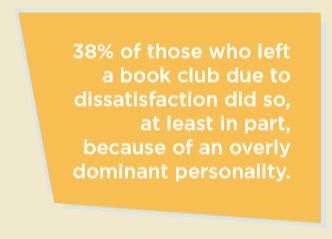As reported in our recent publication The Inner Lives of Book Clubs, the vast majority of book club members surveyed describe their group as a vital and fun aspect of their life. They report enjoying a sense of community and a deepened sense of empathy and, often, close personal friendships.
But even in the most harmonious of book clubs, conflict is likely to arise at some point, and if disagreements are not resolved, problems may grow more intense and people may end up leaving their book club - or worse - they may reach a breaking point and disband the group altogether.
 In our research we've found that one common cause of conflict are overly dominant personalities (ODPs) - people who, whether intentionally or not, occupy too much of the limelight and overpower one or more elements of the book club, such as book selection or the discussion itself.
In our research we've found that one common cause of conflict are overly dominant personalities (ODPs) - people who, whether intentionally or not, occupy too much of the limelight and overpower one or more elements of the book club, such as book selection or the discussion itself.
We have one member who is subtly dominant and sabotages book choices that are more challenging.
One member does a lot of research into books but only in the genre she likes. Because she has done so much work we often feel obligated to choose her books.
One of the original founders sees it as her book club. She talks at least twice as much as anyone else and there can be no changes to our format without her blessing. Members have quit because of this.
One of the members would just talk on about herself and her family; the rest of us couldn't get a word in. It was supposed to be a fun night out but it wasn't, so I quit.
Maggie O'Farrell was born in Northern Ireland in 1972 and grew up in various locations across Wales and Scotland. When she was just eight she contracted encephalitis, an experience she describes in a chapter called "Cerebellum (1980)" in her memoir, I Am I Am I Am. The illness did long term damage, leaving her physically weak and sometimes unstable, and likely brought on neurological traits of unease, oversensitivity and dissatisfaction.
Despite this major childhood trauma, O'Farrell returned to school and attended Cambridge University, studying English before embarking on a career as a journalist. She published her debut, After You'd Gone, in 2000, and is now the author of seven highly acclaimed novels.
In her memoir, I Am I Am I Am: Seventeen Brushes with Death, O'Farrell creates vivid snapshots from her life, based on numerous near-death experiences, but there are only a few references to her successful career as an author. Readers curious to map O'Farrell's literary output to the incidents described in her memoir may find the following chronology of interest:
Choosing only a handful of books to read about the Caribbean is like holding a small mound of snow in your palms. You know each snowflake is unique and you also know that you've only touched a fraction of what is falling from the sky. And while you may be hard pressed to find snow on any part of the Caribbean, you can easily discover countless stories about these 7,000 islands, and all of them are different. Still, just as it is magical to hold those few snowflakes, it is also magical to read any of the half dozen books we've culled together here.